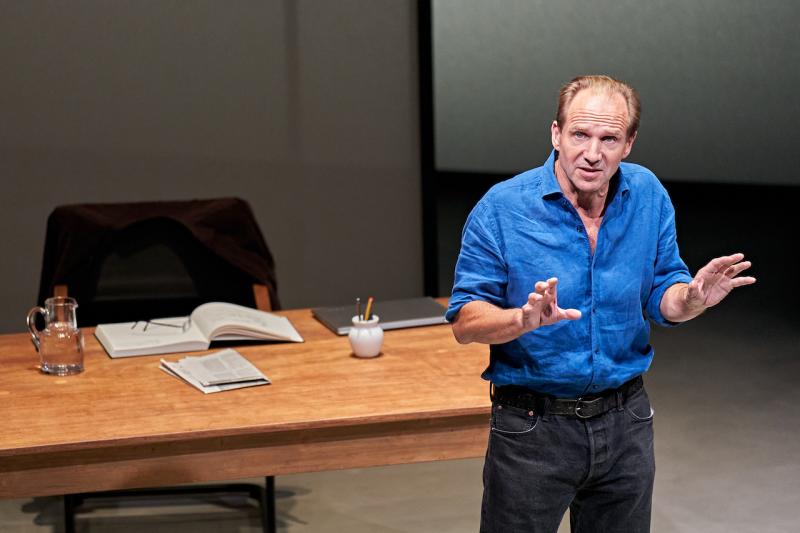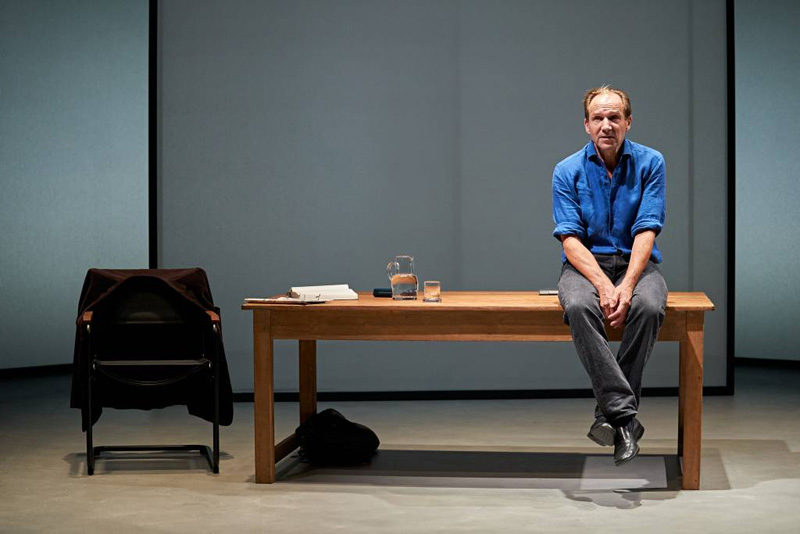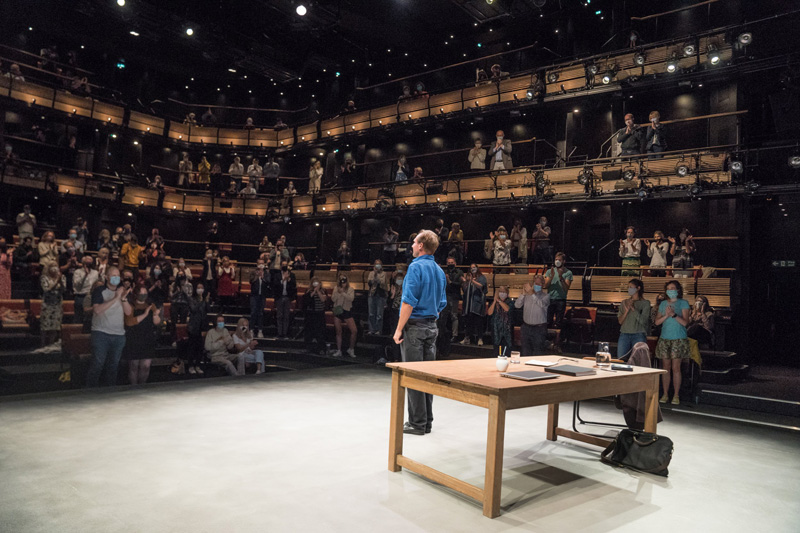“Beat the Devil”: David Hare, Bridge Theatre
Julie Sorokurs on the South Bank
1 September 2020
The Bridge Theatre tentatively opened its doors in late August for a Covid-conscious season of one-person shows, with less than a third of its seats available to audiences. While the National Theatre, just a bit further along the south bank of the Thames, remains shuttered, the Bridge (run by the National’s former artistic director Sir Nicholas Hytner) has taken the lead in bringing back live indoor drama to London theatre – for which it deserves much credit.

Ralph Fiennes in Beat the Devil. Photo credit: Manuel Harlan.
lt can now boast a one-way queuing system (during which your temperature is taken by a heat-sensitive camera on the ceiling), contactless tickets and payments, the allocation of arrival time slots (to further maximize distance between audience members), and the mandate that face masks are to be worn both in the auditorium and foyer.
A succinct fifty minutes, David Hare’s monologue Beat the Devil — about surviving Covid-19 — is the first in this new series. It is currently being performed to an audience that has been broken up into isolated clusters of one, two, and three – with every other row in this 900-seater taken out entirely. l myself had the guilty luxury of a single seat, with enough room on either side of me to seat at least three more people.
It was definitely the most dissonant experience l’ve had in the theatre. lt was as site-specific as a play about Covid-19 could be. I felt overwhelmed at how fortunate l was to be able attend the performance (and strangely comforted by the fact that l’ve already been ill with the virus and have recovered successfully), but l nevertheless found myself very uneasy. Despite the theatre’s best efforts, l was aware that not everybody was acting in accordance with social distancing outside the auditorium. Have we jumped the gun in reopening our indoor theatre? The truth is that it is impossible to ensure a totally risk-free environment in enclosed public spaces.
It didn’t help matters that after a five-month break from live indoor theatre the show itself is a bit of an anti-climax. Directed by Hytner, Beat the Devil is too on-the-nose for the subtlety of its set design (Bunny Christie’s minimalist set consists of slim, blue screens and a humble writing desk) and music (George Fenton). Most disappointingly, the play showcases how even Ralph Fiennes’s easy command of both stage and script can’t salvage what comes across as a rush-job. As it is essentially a dramatic reading of a personal essay about being ill with Covid-19, Beat the Devil very much puts Hare’s writing forward — which is where it goes wrong, as there’s very little of it that isn’t a rehashing of what we’ve all collectively gone through in this moment in history.

Ralph Fiennes in Beat the Devil. Photo credit: Manuel Harlan.
The majority of the action is in Fiennes pacing the stage, though occasionally he sits down in a chair, and sometimes he switches to leaning against the desk. Our focus is entirely on the measured cadence of his voice, and the occasional bubbling-over of the rage just beneath the surface. l imagine it wasn’t hard for Fiennes to identify with Hare’s mounting fear, confusion, and distress – it certainly wasn’t hard for me to reciprocate it as an audience member.
l have many problems with this play, and one of them is that it is, in every sense, too easy. It was too easy for Hare to write a bland, extended version of every tweet, news article, and blog post l’ve read since lockdown began, and too easy for Fiennes, who simply has to say it all back at us with all the unresolved emotion he undoubtedly has (we all do)!
The personal touches are, naturally, some of the only redeeming parts Hare apparently had video calls with his GP twice a day during what was a 16-day illness, calls in which the dynamic seemed to be one of a very concerned doctor nagging a very stubborn patient. In a particularly memorable exchange that Hare recalls, his GP is seriously considering putting him into hospital – but Hare refuses, because people with Covid-19 might be there. There is a charm, if not even some poignancy, to his detailing such fever-addled worries of catching the virus while in hospital with the virus.

Ralph Fiennes in Beat the Devil. Photo credit: Manuel Harlan.
Hare tells us that he spent most of his time watching the new while he was ill; during the majority of the monologue, he goes into painstaking detail about how members of the British government each stepped on one proverbial banana peel after another (as if we missed these?). The theatre is surely most vital now for stories about Covid-19 that amount to more than this, a series of well-worn references to Donald Trump’s The Art of the Deal and Boris Johnson privileging his pregnant girlfriend over his country, only punctuated by Hare’s occasional reveries about his own extensive career as a playwright and the clever things his famous colleagues have to say about the virus too.
This surface-level coverage of government ineptitude lent a dangerously glib tone to some complex matters For instance, Hare acknowledges the sobering fact that black people are more likely to die from the virus than are their white neighbours. But are people of colour to be referred to only as a statistic to further shame the Tories, to an audience that is already overwhelmingly left-leaning, and white? This aside was too much of a throwaway remark (emblematic of my above-mentioned reservations about it all too easy), made all the more flippant by a very deliberate pause from Fiennes. (Deliberate pauses, by the way, abound in Beat the Devil — normally after other trite phrases like “if I wasn’t gagging already, l’d gag” and “l don’t have survivor’s guilt, l have survivor’s rage”; they absolutely litter what is, on the whole, a one-note, milquetoast tirade.
But to his credit, Hare does admit to his privilege, and to his experience being a relatively charmed one, especially compared to those of so many people considerably younger than him (he turned seventy-three this year). “Many younger people are going to die,” he says very frankly. “l am startled to come out of this.” I wish the play had been more like this, about his recovery, as he left quite a few startling thoughts that could have been explored more deeply, including, “The virus is in me and always will be.” These last observations were easily the most gripping.










